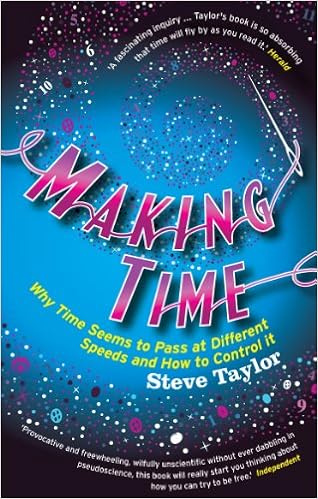Sometimes it seems as if life is passing us by. When we are children, time ambles by, with endless car journeys and summer holidays which seem to last forever. But as adults, time seems to speed up at a frightening rate, with Christmas and birthdays arriving more quickly every year.
But perhaps it doesn’t need to feel this way. Our experience of time is flexible, speeding up in some situations and slowing down in others. There are even some altered states of consciousness (such as under the influence of psychedelic drugs, in traumatic situations, or when athletes are “in the zone”) in which time seems to slow down to an extraordinary degree.
So maybe by understanding the psychological processes behind our different experiences of time, we might be able to slow things down a little.
In my book Making Time, I suggest a number of basic “laws” of psychological time, as experienced by most people. One of these is that time seems to speed up as we get older. Another is that time seems to slow down when we’re exposed to new environments and experiences.
These two laws are caused by the same underlying factor: the relationship between our experience of time and the amount of information (including perceptions, sensations and thoughts) our minds process. The more information our minds take in, the slower time seems to pass.
This partly explains why time passes so slowly for children and seems to speed up as we get older. For children, the world is a fascinating place, full of new experiences and fresh sensations. As we get older, we have fewer new experiences and the world around us becomes more and more familiar.
We become desensitised to our experience, which means that we process less information, and time seems to speed up. (Another factor may be the “proportional” aspect, which is that as we get older each period of time constitutes a smaller proportion of our life as a whole.)
It follows, then, that our experience of time should expand in unfamiliar surroundings, because this is where our minds process more information than normal. When you go away to a foreign country you are much more sensitive to your surroundings. Everything is unfamiliar and new, so you pay much more attention and take in much more information.
It’s the same when you spend a day on a training course, learning new things with a group of unfamiliar people. It feels like more time has passed than would have done if you had stayed at home following your normal routine.
All of this leads to two simple suggestions about how we can expand our experience of time.
Firstly, since we know that familiarity makes time pass faster, we can slow down time by exposing ourselves to as much new experience as possible. By travelling to new places, giving ourselves new challenges, meeting new people, exposing our minds to new information, hobbies and skills, and so on. This will increase the amount of information our minds process and stretch out our experience of time passing.
Secondly, and perhaps most effectively, we can slow down time by making a conscious effort to be more “mindful” of our experiences. Mindfulness means giving our whole attention to an experience – to what we are seeing, feeling, tasting, smelling or hearing – rather than to our thoughts.
In the moment
It means living through our senses and our experience rather than through our minds. It’s a different approach to avoiding familiarity – and happens not by seeking new experiences, but by changing our attitude to our experiences.
When you’re having a shower in the morning, for example – instead of letting your mind chatter away about the things you’ve got to do today or the things you did last night, try to bring your attention to the here and now, to really be aware of the sensation of the water splashing against and running down your body and the sense of warmth and cleanness you feel.

Shutterstock
Or on the way home from work on the bus or the train – instead of mulling over all the problems you’ve had to deal with at work, focus your attention outside of yourself. Look at the sky, at the houses and buildings you pass and be aware of yourself here, travelling among them.
Read more:
Why time seems to go by more quickly as we get older
When you do chores such as mowing the lawn or washing the dishes, don’t listen to music on your headphones or let yourself daydream. Give your attention to the objects and phenomena around you and the physical sensations you are experiencing.
One thing you’ll find is that these chores become more enjoyable. And you’ll also discover that this open and alert attitude to your experiences has a time-expanding effect, since mindfulness increases the amount of information we process.
From this point of view, we don’t have to think of time as an enemy. To a certain extent, we can understand and control our experience of time passing.
Many of us try to make sure we can live for as long as possible by eating good food and exercising, which is sensible. But it’s possible for us to increase the amount of time that we experience in our lives in another way – by expanding our experience of time.
Steve Taylor, Senior Lecturer in Psychology, Leeds Beckett University
This article is republished from The Conversation under a Creative Commons license. Read the original article.


